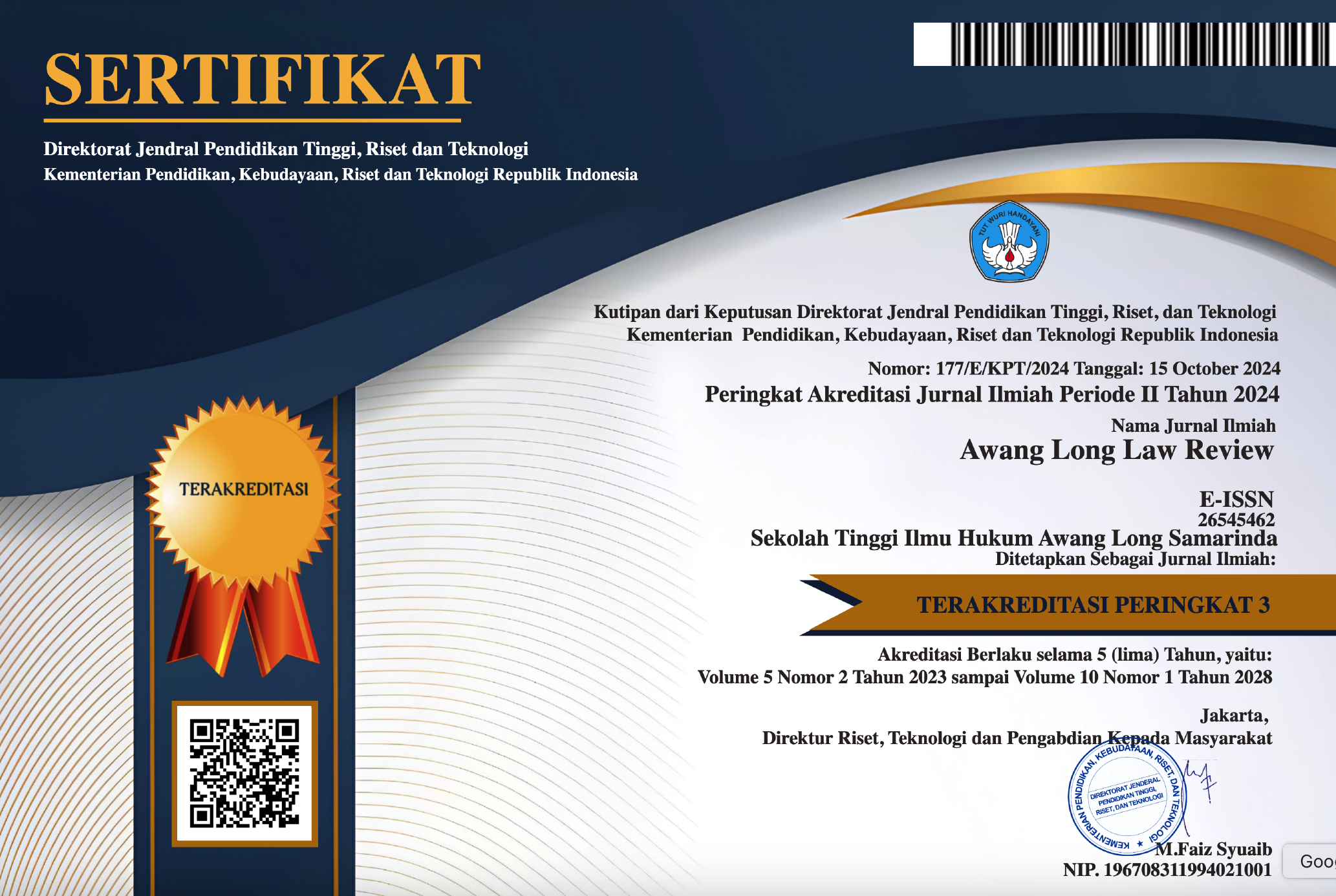THE ROLE OF THE NOTARY IN SETTLEMENT OF CRIMINAL CASES BASED ON RESTORATIVE JUSTICE
Abstract
Restorative Justice is an effort to find a peaceful process for resolving cases outside of court. This research uses normative legal research methods. The urgency of resolving criminal cases based on restorative justice is essentially the resolution of criminal cases by involving the perpetrator, victim, family of the perpetrator/victim, and other related parties to jointly seek a fair solution by emphasizing restoration to the original condition, and not retaliation. The main point of resolving criminal cases based on restorative justice is the existence of a peace agreement between the victim and the perpetrator of the crime. Peace agreement and fulfillment of the rights of victims of criminal acts.
To prepare a peace agreement signed by the parties, of course it must be formulated in writing and can be drafted and signed in the presence of an authorized official. If necessary, this is where the role of a Notary can be used in drafting a peace agreement through a peace deed made and signed before a Notary. To strengthen the validity of the peace agreement letter and the need for legal protection, guarantees in fulfilling the rights of the victim, to avoid acts of default on the peace agreement between the criminal perpetrator and the victim, it can be formulated through an authentic deed, namely a peace deed made and signed before a Notary.
Downloads
References
Achmad Ratomi, "Concept of Procedures for Implementing Diversion at the Investigation Stage in Resolving Crimes Committed by Children", Legal Arena Journal, Vol.6, No.3, December 2013.
Bunyamin Alamsyah, Law Enforcement and Justice in Indonesia Between Expectations and Reality, Legality Journal Volume IV Number 1 June 2013 Edition.
Dwidja Priyatno, Punishment for Children in the Draft Criminal Code Concept (within the Restorative Justice Framework), Child Rights Advocacy Institute (LAHA), Edition VIII/Volume III, Bandung, 2007.
Hans Jorg Albercht, Settlements Out of Court: A Comparative Study of European Criminal Justice Systems, Research Project Report (research paper 19) South African Law Commission, 2001.
Hasbi Hasan, Application of Restorative Justice in the Juvenile Criminal Justice System in Indonesia, Journal of Law and Justice, Volume 2 Number 2 July 2013.
https://www. Hukumonline.com/klinik/a/pengesaian-perkara-pidana-dengan-princi-keadilan-restoratif
Karim, Characteristics of Resolving Minor Crime Cases through Restorative Justice, Surabaya: CV. Jakad Media Publishing, 2020.
Nurul Widhanita, Criminological Review of Crimes of Narcotics Abuse, Journal of Restorative Justice Vol. 7 No. 1, May 2023.
Mahendra, Adam Prima, "Penal Mediation at the Investigation Stage Based on Restorative Justice", Jurist-Dictionary Journal 3(4), 2020.
Rena Yulia, Application of Restorative Justice in Judges' Decisions: Conflict Resolution Efforts Through the Criminal Justice System, Judicial Journal Vol. 5 No. August 2, 2012.
Rossel Ezra Johannes Tuwaidan, Authority of Notaries According to Law Number 2 of 2014 concerning Amendments to Law Number 30 of 2004 concerning the Position of Notaries, Lex Privatum Journal Vol. VI/No. 6/Aug/2018.
Rocky Marbun, Deni Bram, Yuliasara Isnaeni and Nusya A., Complete Legal Dictionary (Includes the Latest Legal & Legislative Terms, First Printing), Visimedia, Jakarta. 2012.
Rosnia Agussari, Deed of Peace by a Notary in Handling Criminal Acts Based on Restorative Justice, Media Of Law And Sharia Journal Volume 3, Issue 2, 2022.
Soerjono Soekanto and Sri Mamudji, Normative Legal Research: A Brief Overview, Rajawali Press, Bandung, 2001
Salim HS, Contract Law Theory and Drafting Techniques, 8th printing, Jakarta: Sinar Graphics, 2006.
Septa Candra, Restorative Justice: A Review of Criminal Law Reform in Indonesia, RechtsVinding Journal, Vol. 2 No. 2, August 2013.
Zainab Ompu Jainah, Law Enforcement in Society, Journal of Rural and Development Volume III No.2 August 2012.
Copyright (c) 2024 Neisa Angrum Adisti, Alfiyan Mardiansyah, Isma Nurillah, Desia Rakhma Banjarani

This work is licensed under a Creative Commons Attribution-ShareAlike 4.0 International License.







